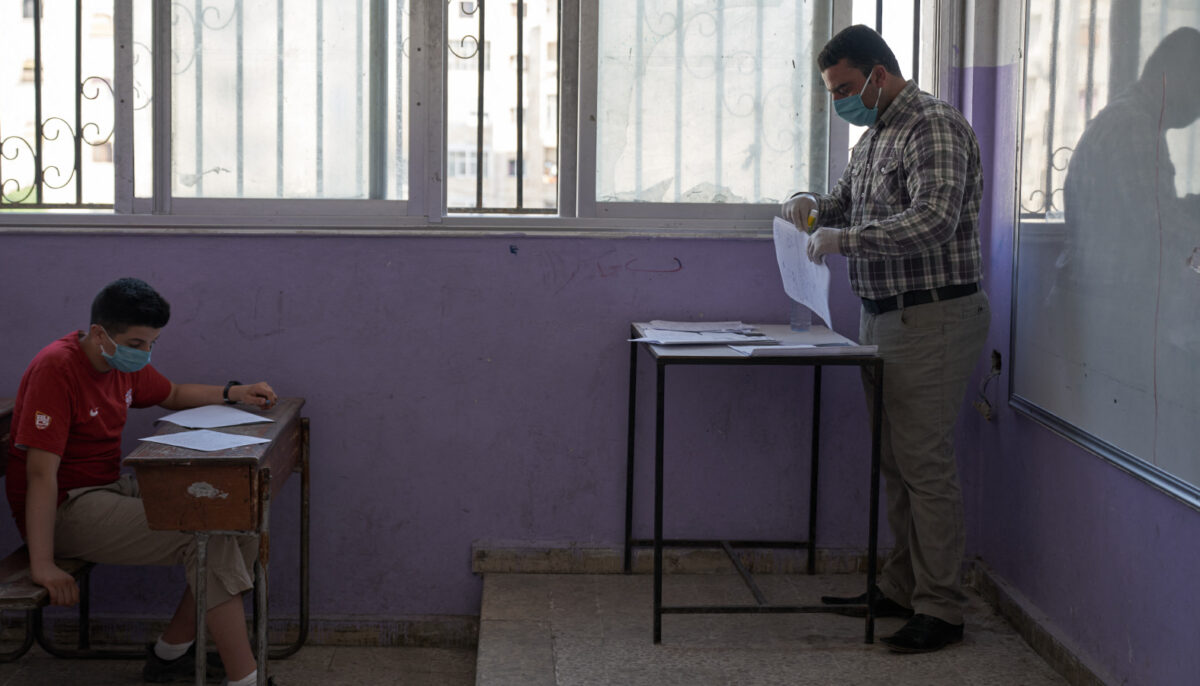Despite a global trend towards improving the speed, quality, and availability of internet services, Syria still disrupts access to the internet and communications during the country’s official exams.
Reham, who was in Syria and fell ill during the exams period, could not call an ambulance or a friend due to internet shutdowns.
“I woke up all alone, knocked out from the severity of the pain.”
Since May 26, authorities have been cutting off communications from 8:00 to 9:30 a.m. and suspending the internet for at least three hours a day, as requested by the Ministry of Education.
The ministry claims this is “to ensure the fairness and integrity of the first round of the 2024 exams.”
These actions contradict Syria’s 2030 digital transformation strategy which led the Ministry of Communications to launch multiple new e-services.
In 2021, the Minister of Education, Darem Tabaa, made the yet-unfulfilled promise to keep the internet on during exam periods.
The deathly cost of communications shutdowns
Despite widespread discontent regarding the decision to shut down the internet every year in Syria, authorities have yet to put an end to this damaging practice.
Internet shutdowns disrupt the country’s vital sectors, impacting banking transactions and the availability of medical services, putting people’s lives and safety at risk.
On June 6, 2024, a mother and her three children were killed in a house fire in Al-Dimas, west of Damascus, when they couldn’t ask for help due to exams-related communications and internet shutdowns. The father was also severely injured.
These deaths could have been prevented if the family had access to digital communications.
“Exam shutdowns delayed notifying the firefighters, so we had to use our municipality tanker instead, but it was not enough. We needed more vehicles; we couldn’t control the fire well enough,” said Mazen Aoun, Qora Al Assad’s Municipality President.
Internet shutdowns also severely impact remote workers, particularly those in breaking news and emergency response fields, who often need to take prompt action.
“The nature of my job requires that I remain on-call to proofread new footage and new daily news reports,” Rim, a remote-working linguistic proofreader for a German employer, told SMEX.
“I explained to my superiors the ‘strategy’ followed in Syria to prevent cheating during exams, so they had to reassign this task to a colleague in a different country while I worked on proofreading non-urgent content.”
In a report issued in June 2022, Michelle Bachelet, the former United Nations High Commissioner for Human Rights (UNHCR), warned about the devastating effects of internet shutdowns.
“Authorities often justify communication interruptions as necessary for the preservation of public peace, the containment of acts of discrimination, aggression, or violence, or the combatting of misinformation,” explained the UNHCR.
Ironically, the report shows how shutdowns often lead to the opposite, increasing fear and confusion and feeding division and conflict.
Exam shutdowns impact work prospects
“I was accepted for a position as a remote translator for a British magazine, but the timing was not in my favor,” Janseet, a remote worker in Syria, told SMEX.
Janseet explained how internet shutdowns jeopardized her chances of landing the new job.
“I had told the recruiters that I would always submit assignments on time and that I would work to overcome [logistic] obstacles,” she added.
“However, when I took my third assessment, candidates from other countries outperformed me.”
“I explained my situation to the manager, who was understanding and aware of the situation in Syria, but they had to decrease my salary because I couldn’t guarantee meeting deadlines,” she continued.
Syria’s telecommunications sector was already weak, and authorities had previously banned internet access to stifle protests.
Ongoing conflict and infrastructure damage worsened the situation, causing frequent service interruptions, especially in rural areas. Eventually, telecommunications companies like MTN left the Syrian market.
Shutdowns violate rights and further isolate Syria
Internet shutdowns deprive people of their rights, including access to information and freedom of expression, as well as the right to work and education. They also erode citizens’ trust in internet services.
Joumana, a high school teacher, believes that shutdowns are useless and ineffective in limiting exam cheating: “Even in times of war, internet and telecom services must stay on.”
“Imagine that authorities are shutting them down just for exams! Instead, they can simply carry out thorough inspections.”
“There are still many ways to get the test questions leaked, and blocking the internet is useless. Such a measure has nothing to do with the integrity of examinations; it is a clear violation of human rights.”
Syrian economic experts have previously warned that shutting down the internet has grave effects, as the banking sector faces severe damages during interruptions to online deposits and withdrawals.
Ammar Youssef, economic analyst, noted that “emergency response teams, such as firefighters, first-aid responders, and the police, are all affected by Internet and telecom shutdowns.”
Youssef further explained that shutdowns block Syria’s communications with other countries and temporarily isolate it from the global system.
They additionally strain citizens and government institutions, disrupt the flow of work in the morning, and contribute to the failure of state sectors and private companies.
Abed Fadila, a Syrian economic analyst, explained to SMEX that authorities conceal the severity of the damage resulting from yearly internet shutdowns by claiming that state institutions are linked through an internal network via a central server.
In terms of numbers, Fadila emphasized that “financial losses resulting from internet and telecom shutdowns reach 80 billion Syrian pounds yearly (more than 6 million US dollars), knowing that the average annual GDP is estimated at around 9 billion US dollars.”
“These calculations are based on the assumptions that there are 313 working days yearly, and that the average cut-off time is only an hour and a half for telecom services and two hours for Internet access (although it exceeds that).”
Syrian economic experts find the situation alarming, particularly as shutdowns hinder access to banking services. They warn of the severe damage telecom interruptions can inflict on the banking sector.
Cheating incidents prove the ineffectiveness of internet shutdowns in fighting leaks and cheating attempts.
Shutdowns undermine the Syrian economy, damaging all companies that require a stable Internet connection for smooth workflow.
This is especially crucial today, as by mid-2023, the number of Syrians living below the poverty line exceeded 90%, half of the population became unable to procure or afford good food, and approximately 15 million Syrians needed humanitarian assistance.



